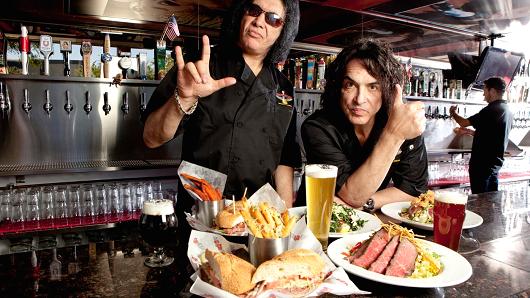Daniel Bukszpan | Music & Musicians
Earlier this month, legendary KISS bassist and singer Gene Simmons submitted a trademark application that sought to register a familiar sight at rock concerts. The business-savvy rocker wanted to corner the market on the “devil horns” hand gesture, a fixture among heavy metal audiences for decades.
 Simmons’ attempt was met by criticism from throughout the music world, and widespread derision in the media. The controversy proved short-lived, as Simmons this week abandoned his quest with the United States Patent and Trademark Office. Simmons did not respond to CNBC’s request for comment.
Simmons’ attempt was met by criticism from throughout the music world, and widespread derision in the media. The controversy proved short-lived, as Simmons this week abandoned his quest with the United States Patent and Trademark Office. Simmons did not respond to CNBC’s request for comment.
Still, the rocker’s attempt raised an interesting question about whether he–or anyone else for that matter–could actually prevail in such a quest to make money from a hand gesture. In the wake of Simmons’ aborted effort, CNBC canvased a few experts to get their take.
“It is very highly unlikely that the United States Patent and Trademark Office, who examines and registers trademarks, would issue one for Mr. Simmons,” said John Conway, a trademark and business law attorney and CEO of the Astonish media group.
“Mr. Simmons would have to somehow demonstrate the uniqueness or special meaning… that consumers would automatically connect that hand signal to Mr. Simmons as an artist,” he added. Conway also pointed out that the gesture is used in sign language, and is similar to the one used by Spider-Man to spin a web—which dates back to at least the 1960’s.
The web-slinging teen from Queens is far from the only one.
“John Lennon used it at least as early as 1969 on the cover of the Beatles’ ‘Yellow Submarine’ album,” Conway added. “It has been used by many other artists and fans in the heavy metal genre for decades. The origins of the hand sign go back to medieval Italian hand signs to ward off curses.”
‘Quite difficult’
Establishing the origin of the gesture is only one hurdle that Simmons would have had to overcome. Even if he had been granted the trademark, enforcement would prove daunting.
“Enforcing it would be quite difficult,” said Ryan Vacca, Professor of Law at the University of New Hampshire School Of Law.
“He wouldn’t be able to sue fans at an Iron Maiden concert because they’re likely not using the gesture in commerce,” Vacca added. “If they’re simply making the gesture as part of enjoying the music and show, they’re not infringing.”
Earning revenue from the gesture, however, is not entirely out of the question. Alexander Butterman, a trademark attorney for the Staas & Halsey intellectual property law firm, said that he could earn money by commercializing it.
“Place images of it on mugs, T-shirts, license plates, posters and lithographs, and acquire licensing revenue from that,” he said.
However, the main sticking point would be establishing the gesture’s origin. Trademark and copyright attorney Eric Perrott of the Gerben Law Firm said that the move has been done successfully in the past—but only in cases in which the gesture in question was clearly a one-off.
“One that comes to mind is the University of Florida ‘gator chomp’ or the Florida state ‘chop,'” he said.
“These are gestures that uniquely identify services, namely, the exhibition of college football. However, something like the ‘devil horns’ is so ubiquitous in rock culture that I imagine this was mostly just a stunt and is completely unenforceable,” the lawyer added.
‘Outrageous’
There’s one avenue of explanation left unexplored: Some—such as Jason Harris, CEO and President of the Mekanism advertising agency—think Simmons envisioned the patent for publicity.
“It is clearly a stunt, something KISS and Simmons do incredibly well,” he said. “Simmons created the KISS Kasket and KISS Condoms as stunts… it is all in service to staying in the headlines.”
Harris added: “He knows he can’t really trademark the ‘devil horns,’ just like you can’t trademark the middle finger or the ‘number one’ sign or the ‘thumbs up.'”
Colin Fowler, a patent and trademark attorney with the Perkins Coie law firm, agreed.
“It’s outrageous and generated buzz for him,” Fowler said. “$275 is a small price to pay for media buzz and advertising.”
